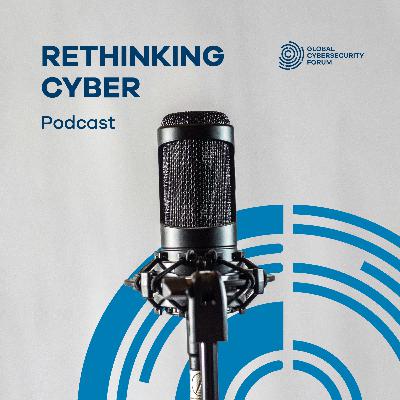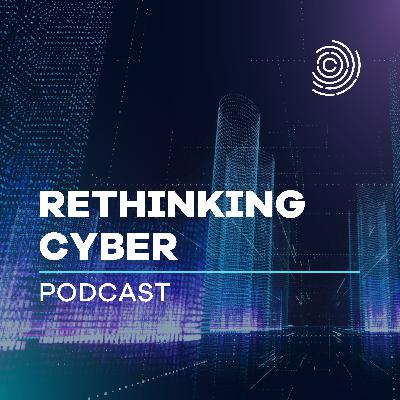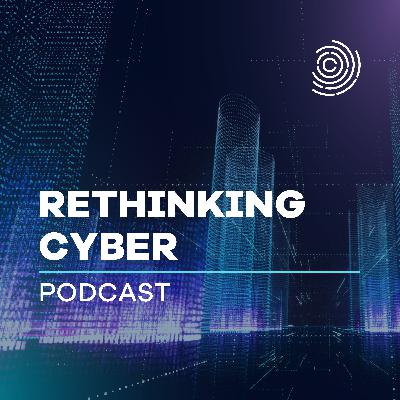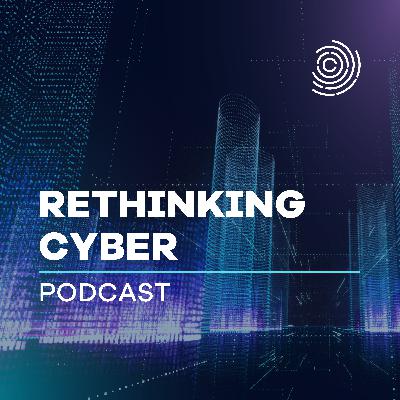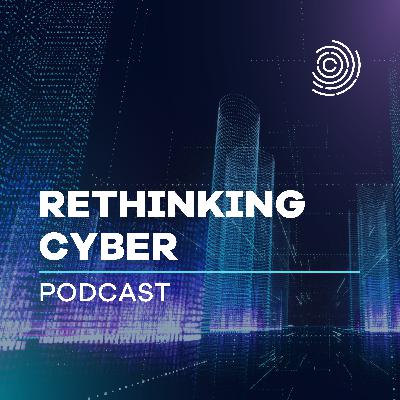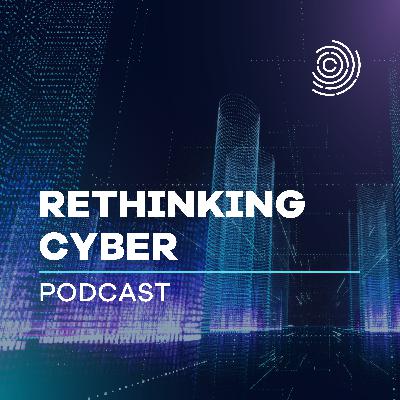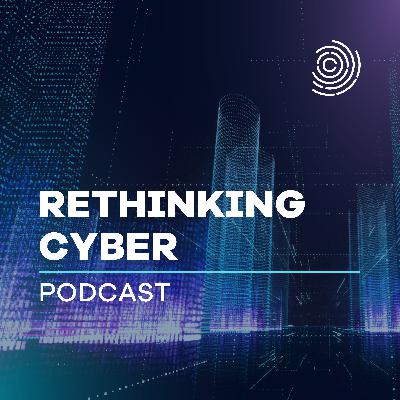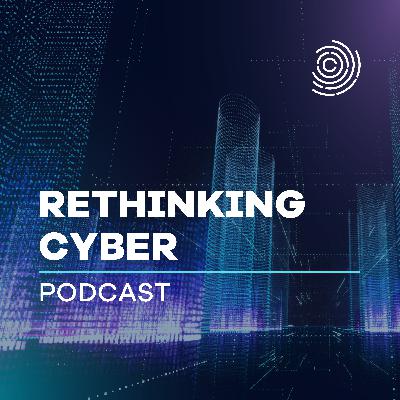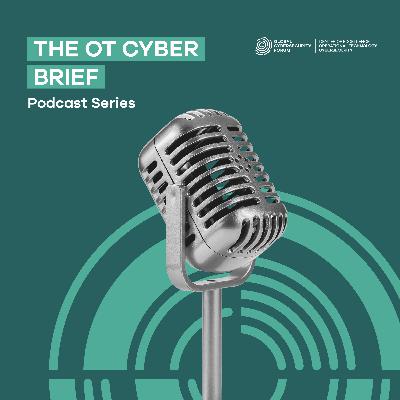Discover Rethinking Cyber
Rethinking Cyber

Rethinking Cyber
Author: Global Cybersecurity Forum
Subscribed: 2Played: 1Subscribe
Share
© Global Cybersecurity Forum
Description
The Rethinking Cyber podcast is designed to transform the way we think about Cyberspace through straightforward and thought-provoking conversations with leading experts and decision makers. This podcast bridges the gap between abstract concepts and real-world developments, offering listeners a clearer understanding of Cyberspace’s impact on our societies, economies, and nations.
22 Episodes
Reverse
How can nations maintain cyber resilience when technologies like artificial intelligence (AI) and quantum computing are evolving faster than regulation? Robert Hannigan, Director of GCHQ (2014-2017) - the UK's intelligence, security and cyber agency - looks at what lessons can be learned from the decades before AI to build long-term security.Drawing on his experience in policy development, Hannigan poses that the nature of Cyberspace requires governments and the private sector to join efforts to secure infrastructure and economies. He also highlights the need to ensure that technology itself is designed securely, while building resilience into physical and cyber infrastructure. As agentic AI accelerates in sophistication, Hannigan makes the case for keeping human judgment, ethics, and oversight at the center of cybersecurity strategies.Brought to you by the Global Cybersecurity Forum (GCF), the Rethinking Cyber podcast shares the latest insights from decision-makers and experts on the opportunities and challenges shaping Cyberspace.
As our world evolves against the backdrop of ongoing polycrisis and technological advancement, are we doing enough to secure industrial infrastructure?
Robert Lee, CEO and Co-founder, Dragos, shares his insights on the urgent need for better collaboration, information sharing, and improved defenses in industrial automation environments to advance collective action for cyber stability. He emphasizes the social aspects of technologies and placing human safety and wellbeing at the core of Cybersecurity strategies.
Brought to you by the Global Cybersecurity Forum, the Rethinking Cyber podcast is here to share insights from the world’s leading minds as we navigate our cyber future.
At a time when over 5.3 billion people worldwide are active in Cyberspace, what can nations, companies, and individuals do to ensure their security against threats?
William H. Dutton, Martin Fellow at Oxford University’s Global Cybersecurity Capacity Centre, shares his insights on the reason cybersecurity maturity depends not only on innovation, but also on culture, policy, education, and economic development. He tells us why Cyberspace today can never be fully immune to attacks, and explores how cybersecurity is evolving to stretch across disciplines as varied as psychology, politics, and sociology.
Brought to you by the Global Cybersecurity Forum (GCF), the Rethinking Cyber podcast is here to share insights from thought leaders and industry experts for straightforward and thought-provoking conversations on the opportunities and challenges shaping Cyberspace.
How does empowering women in cybersecurity drive economic growth and innovation?
And how can Cyberspace help make our societies more inclusive?
Kersti Kaljulaid, former President of Estonia from 2016-2021, joins us to discuss why we need to bring more women into the cybersecurity field, sharing valuable lessons from Estonia’s model for women’s empowerment and its contribution to fostering innovation and resilience.
Brought to you by the Global Cybersecurity Forum (GCF), the Rethinking Cyber podcast is here to share insights from thought leaders and industry experts for straightforward and thought-provoking conversations on the opportunities and challenges shaping Cyberspace.
How can existing technologies be leveraged to tackle the most pressing cyber challenges? Dr. Craig Wright, Chief Scientist at nChain, joins us to demystify Distributed Ledger Technology, address misconceptions around crypto, and share what inspired his career journey.
Brought to you by the Global Cybersecurity Forum, the Rethinking Cyber podcast is here to demystify Cyberspace and help you understand the opportunities it presents – and help you navigate its risks.
Interpol’s first global crime trends report, launched at its 2022 General Assembly, ranked cybercrime as one of the top five growing global threats. Interpol’s Director of Cybercrime, Craig Jones, joins us to discuss the increasing challenges relating to policing cybercrime, how cyber criminals are evolving their business model in Cyberspace and efforts to drive global collaboration between law enforcement agencies – and the private sector - to avert cyber attacks and catch cyber criminals.
Children accessing the internet is now a societal norm and this access is happening at ever younger ages. The benefits can be vast, but evolving cyber risks means that protecting children online can be daunting and complex. Iain Drennan, Executive Director of the largest international network focused on ending child sexual abuse and exploitation online, the WeProtect Global Alliance, joins us to explain the growing risks and the need for collaboration across borders and across industries to ensure children’s safety.
Brought to you by the Global Cybersecurity Forum, the Rethinking Cyber podcast is here to demystify Cyberspace and help you understand the opportunities it presents – and help you navigate its risks.
Dr. Mary Aiken, a world-leading expert in cyberpsychology, joined us at the 2022 Edition of the Global Cybersecurity Forum for a captivating discussion. As one of the acknowledged founders of a new global sector, ‘Safety Tech’, Dr. Aiken covers everything from the potential of this new sector, the psychology of cybercriminals and encouraging women to enter the field of cyberpsychology.
Brought to you by the Global Cybersecurity Forum, the Rethinking Cyber podcast is here to demystify Cyberspace and help you understand the opportunities it presents – and help you navigate its risks.
What are the barriers to women’s empowerment in cybersecurity, and how can we address them? Leila Hoteit, Managing Director and Senior Partner at BCG, joins us to discuss the imperative of including more women in the field, the obstacles they face, and how to overcome these challenges.
Brought to you by the Global Cybersecurity Forum, the Rethinking Cyber podcast is here to demystify Cyberspace and help you understand the opportunities it presents – and help you navigate its risks.
Will businesses ever be ahead of the curve, or forever playing catch-up as the tech revolution accelerates? Join our guest Alex Liu, Managing Partner and Chairman of the Board at Kearney, as he sheds light on why cybersecurity is at the top of global CEO’s agendas, what are the most pressing cybersecurity challenges businesses face, and how to transform these challenges into opportunities.
Brought to you by the Global Cybersecurity Forum, the Rethinking Cyber podcast is here to demystify Cyberspace and help you understand the opportunities it presents – and help you navigate its risks.
In our first Rethinking Cyber podcast, we welcome world-renowned author, scientist and futurist, Dr Michio Kaku. In this illuminating episode, Dr Kaku talks to us about the seismic impact quantum computing will have on our lives and on industry. He explains the concept of quantum computing, explores what a quantum future will look like and explains the link between quantum physics and the multiverse.
Brought to you by the Global Cybersecurity Forum, the Rethinking Cyber podcast is here to demystify Cyberspace and help you understand the opportunities it presents – and help you navigate its risks.
How can global industries keep their critical systems operating safely and avoid costly, disruptive downtime as cyber risks evolve? Andrew Kling, Director of Cybersecurity and Architecture at Schneider Electric, examines the evolving complexities shaping industrial cybersecurity as operational technology (OT) and information technology (IT) converge – from regulatory compliance and evolving cybersecurity standards to risk management, threat awareness, and preparedness.Drawing on decades of experience across multiple industries and in international standards development, Kling explores how secure-by-design - a “shift-left” approach that embeds cybersecurity at an early stage and anticipates threats - can build resilience into the industrial control systems (ICS) powering our critical infrastructure. Looking to the future, he also speaks of the important role of multistakeholder collaboration as cyber threats and technologies evolve.Brought to you by GCF’s Operational Technology Cybersecurity Center of Excellence (OTC-CoE), the OT Cyber Brief podcast shares insights from industry leaders and experts on global priorities in OT cybersecurity.
How can healthcare systems embrace groundbreaking technologies that improve patient care, without compromising the critical infrastructure and patient data that they rely on? Richard Staynings, Chief Security Strategist at Cylera, joins us to explore the evolving risks that accompany the use of advanced technologies in medical environments.From AI-driven precision medicine to the rapid proliferation of interconnected medical devices, Staynings looks at how reliance on Cyberspace is reshaping healthcare delivery and the factors that have made the sector a prime target for cyberattacks. He underscores the urgency of addressing security gaps, given the disruptive and life-threatening impact of ransomware attacks. As innovation is adopted, he emphasizes the need to strike a balance against risks and build in adequate cybersecurity controls.Brought to you by the Global Cybersecurity Forum (GCF), the Rethinking Cyber podcast is here to share insights from decision makers and experts on the opportunities and challenges shaping Cyberspace.
What is the interrelation between Cyberspace and globalization? With over 30 years of experience in international relations and multilateral cooperation, Pascal Lamy, VP of the Paris Peace Forum and former Director-General of the World Trade Organization (WTO), delves into the challenges and opportunities presented by globalization in a borderless, interconnected world. In this episode, Lamy discusses how the parameters of international diplomacy, global trade, and economic growth are evolving in Cyberspace. Exploring the complexities around data flows, he shares insights on how decision makers can navigate data governance and leverage the potential of emerging technologies for global security and prosperity. He also reflects on how “polylateralism” can re-frame international collaboration on pressing issues in cybersecurity to be more inclusive, purpose-led and impact-oriented. Brought to you by the Global Cybersecurity Forum (GCF), the Rethinking Cyber podcast is here to share insights from decision makers and experts on the opportunities and challenges shaping Cyberspace.
What role does cybersecurity play in shaping the future of healthcare? Dr. Junaid Nabi, a Senior Researcher at Harvard Business School, dives into the nexus between cybersecurity, patient safety, and trust in the new era of interconnected healthcare. Focusing on the uniquely sensitive nature of healthcare data, Dr. Nabi considers the challenges of maintaining public trust amid rising cyber threats. An expert in digital health transformation, he highlights the potential of technologies like artificial intelligence (AI) and machine learning to improve data processing while advocating for ethical frameworks that address healthcare inequities. Drawing from lessons learned during the COVID-19 pandemic, Dr. Nabi underscores the importance of cross-border data sharing for enabling coordinated global responses to future crises.Brought to you by the Global Cybersecurity Forum (GCF), the Rethinking Cyber podcast is here to share insights from thought leaders and industry experts for straightforward and thought-provoking conversations on the opportunities and challenges shaping Cyberspace.
How can we balance public safety and trust in an open, borderless Cyberspace?Professor William H. Dutton, Oxford Martin Fellow at the Global Cyber Security Capacity Centre (GCSCC), explores the challenge of balancing safety and trust in Cyberspace. Drawing on his experience in broadcast regulation, he warns against over-regulation of the internet and potential harms to privacy and freedom.Author of The Fifth Estate: The Power Shift of the Digital Age, Professor Dutton argues that bringing cybersecurity experts and broadcast regulators together can deliver many of the solutions needed to protect adults and children when it comes to inappropriate and harmful content. He explores the behavioral dimension of cyber safety and how we can look beyond law and policy to regulate behavior, such as developing shared principles. He underscores the importance of striking a balance between protecting the public and preserving their confidence in Cyberspace as a space to access vital information.Brought to you by the Global Cybersecurity Forum (GCF), the Rethinking Cyber podcast is here to share insights from thought leaders and industry experts for straightforward and thought-provoking conversations on the opportunities and challenges shaping Cyberspace.
How can nations unite to tackle the borderless nature of cybersecurity? Ambassador Shyam Saran, India’s former Foreign Secretary and former Special Envoy for Nuclear Affairs and Climate Change, explains why cybersecurity must be tackled as a shared global challenge—much like climate change—and how nations can work together despite geopolitical divides. Drawing on his experience in high-stakes negotiations, Ambassador Saran explores the rapid acceleration of cyber risks, their intersection with other global issues such as nuclear security, and the reason governance structures struggle to keep pace with cyber‘s “multiplicator” effect on every sector and industry. He also discusses how technological leapfrogging can drive economic growth and why addressing asymmetries in cyber capabilities is essential for a secure, inclusive future.Brought to you by the Global Cybersecurity Forum (GCF), the Rethinking Cyber podcast is here to share insights from thought leaders and industry experts for straightforward and thought-provoking conversations on the opportunities and challenges shaping Cyberspace.
How can nations develop cyber strategies that fulfill the needs and aspirations of all stakeholders? In this episode, Chris Inglis, the first U.S. National Cyber Director, joins us to discuss why trust, collaboration, and shared accountability form the foundations of effective national cybersecurity.
Drawing on his leadership in delivering the 2023 U.S. National Cybersecurity Strategy, Inglis highlights the critical need for broad-based consultation between governments and the private sector to develop cyber strategies that effectively align technological innovation with skills development and a framework for governance. Using the Colonial Pipeline ransomware attack as an example, he underscores that cybersecurity isn’t just about protecting data and infrastructure—it’s about safeguarding a society’s confidence in their national security and essential services.
Brought to you by the Global Cybersecurity Forum (GCF), the Rethinking Cyber podcast is here to share insights from thought leaders and industry experts for straightforward and thought-provoking conversations on the opportunities and challenges shaping Cyberspace.
How does the human mind cope as we become increasingly dependent on an ever-evolving Cyberspace?
Dr. Mary Aiken, a pioneering expert in cyberpsychology and Chair of the Cyberpsychology Department at Capitol Technology University, explores the intersection between psychology and technology to help us better understand human behavior and develop cognitive resilience in Cyberspace.
She examines how maladaptive tech habits affect people’s well-being, why understanding these patterns is critical, and how cyberpsychology can foster healthier, sustainable behaviors in Cyberspace. Dr. Aiken also highlights social engineering being at the heart of most cyberattacks, with cybercriminals targeting individuals’ psychological vulnerabilities, and emphasizes the need to carefully analyze messages to identify potential threats.
Brought to you by the Global Cybersecurity Forum (GCF), the Rethinking Cyber podcast is here to share insights from thought leaders and industry experts for straightforward and thought-provoking conversations on the opportunities and challenges shaping Cyberspace.
Over the last decade, national intelligence agencies have undergone a significant shift in the way they operate, driven by the evolving dynamics in Cyberspace. Traditionally operating on the margins and in secrecy, these agencies have now started to embrace transparency in order to build credibility with the public and forge partnerships with different stakeholders.
In this episode, Sir Jeremy Fleming, former Director of GCHQ — the UK's intelligence, security and cyber agency — draws on three decades of experience to explore some of these new operational strategies. While covert action remains a tool, Sir Fleming looks at how agencies like GCHQ have invested heavily in communications and education to keep the public informed on cyber threats affecting their daily lives. He also emphasizes the crucial role of mutually beneficial public-private partnerships in national cybersecurity efforts.
Brought to you by the Global Cybersecurity Forum (GCF), the Rethinking Cyber podcast is here to share insights from decision makers and experts on the opportunities and challenges shaping Cyberspace.


